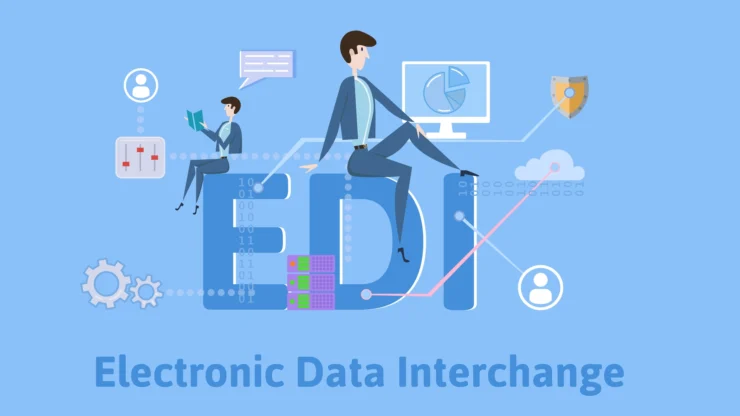In today’s world, online shopping has become an integral part of our lives. With the rise of eCommerce, retailers are constantly looking for ways to streamline their operations and provide a better shopping experience for their customers. One solution that has gained popularity in recent years is EDI integration. In this article, we will explore how EDI integration and eCommerce are the perfect pairings for online retailers.
What is EDI Integration?

Electronic Data Interchange is the computer-to-computer exchange of business documents between companies in a standard electronic format. EDI allows companies to automate the exchange of information, reducing the need for manual data entry, and improving the accuracy and speed of business transactions. EDI integration refers to the process of integrating it into a company’s existing systems, such as eCommerce platforms or enterprise resource planning (ERP) systems.
Why is EDI Integration Important for Online Retailers?
Online retailers often have to deal with a high volume of orders, which can lead to errors and delays in processing. EDI integration can help online retailers streamline their operations by automating the exchange of order information between their eCommerce platform and their back-end systems. This can lead to faster order processing times, improved accuracy, and reduced costs.
Advantages for online retailers
It provides several advantages for online retailers looking to improve their operations and customer experience. Firstly, EDI Integration streamlines operations by automating the exchange of information between the eCommerce platform and back-end systems. This automation leads to faster order processing times, reducing the likelihood of delays and errors, and improving customer satisfaction. Secondly, EDI Integration improves accuracy by eliminating manual data entry, reducing the chances of errors, and resulting in faster order processing times. Thirdly, EDI Integration reduces costs by eliminating the need for manual data entry, which can lead to reduced labor costs and increased productivity. Lastly, a better customer experience is achieved with faster order processing times, improved accuracy, and quicker delivery times, leading to higher customer satisfaction and retention. In summary, EDI Integration is a valuable tool for online retailers, providing several advantages that help improve their operations and customer experience.
Benefits of EDI Integration for Online Retailers

Faster Order Processing Times
Faster order processing times are one of the significant advantages of EDI Integration for online retailers. EDI Integration automates the exchange of order information between the eCommerce platform and the back-end systems, eliminating the need for manual data entry. With EDI Integration, online retailers can process orders faster, leading to quicker delivery times and improved customer satisfaction. Automated order processing reduces the time it takes to process an order, from the time the order is placed to the time it is fulfilled. This increased speed can make a significant difference in meeting customers’ expectations and creating a positive experience. With faster order processing times, online retailers can also better manage their inventory levels, reducing the risk of stockouts, overselling, or overstocking. Overall, faster order processing times are a crucial advantage of EDI Integration for online retailers, enabling them to deliver a better customer experience and improve their bottom line.
Improved Accuracy
Improved accuracy is another crucial advantage for online retailers. With EDI Integration, data is automatically exchanged between the eCommerce platform and the back-end systems, eliminating manual data entry. This automated process reduces the risk of errors and improves accuracy, leading to faster order processing times and a better customer experience.
Eliminates Manual Data Entry

Manual data entry is time-consuming and prone to errors, leading to delays and unhappy customers. With EDI Integration, data is automatically transferred between systems, reducing the risk of human error and improving accuracy.
Reduces Errors
EDI Integration reduces the risk of errors caused by manual data entry, such as typos or incorrect product codes. This results in a more efficient order processing system, reducing the likelihood of returns or order cancellations due to incorrect orders.
Improves Efficiency
With improved accuracy, retailers can process orders faster and more efficiently, reducing the time it takes to fulfill orders. This results in faster delivery times, which can lead to increased customer satisfaction and retention.
Better Inventory Management
With more accurate data, retailers can better manage their inventory levels, reducing the risk of overselling or overstocking. This results in better inventory control, leading to improved profitability and reduced costs.
Reduced Costs

Reduced costs are another significant advantage of EDI Integration for online retailers. By automating the exchange of information between the eCommerce platform and back-end systems, retailers can eliminate the need for manual data entry, reducing the associated labor costs. EDI Integration can also help retailers reduce the costs associated with order processing, including printing, mailing, and storing paper documents. Additionally, with faster order processing times and improved accuracy, retailers can reduce the cost of returns, order cancellations, and inventory management. The reduction in costs can help retailers improve their profitability and invest in other areas of their business, such as marketing, product development, or customer service. In summary, the reduced costs associated with EDI Integration make it a valuable tool for online retailers looking to improve their operations, customer experience, and bottom line.
Better Customer Experience
Better customer experience is a crucial advantage of EDI Integration for online retailers. With faster order processing times, improved accuracy, and quicker delivery times, retailers can provide a seamless shopping experience for their customers. EDI Integration reduces the risk of errors, delays, and order cancellations, which can lead to increased customer satisfaction and retention. By automating the exchange of information, retailers can also provide real-time updates on order status, shipping information, and inventory availability, giving customers the transparency they need to make informed purchase decisions. A better customer experience can lead to increased customer loyalty, positive reviews, and word-of-mouth referrals, ultimately driving revenue growth for retailers.
Conclusion
EDI integration and eCommerce are the perfect pairing for online retailers looking to streamline their operations and improve their customer experience. With faster order processing times, improved accuracy, reduced costs, and a better customer experience, it’s no wonder that more and more online retailers are turning to EDI integration to help them succeed in today’s competitive marketplace.

